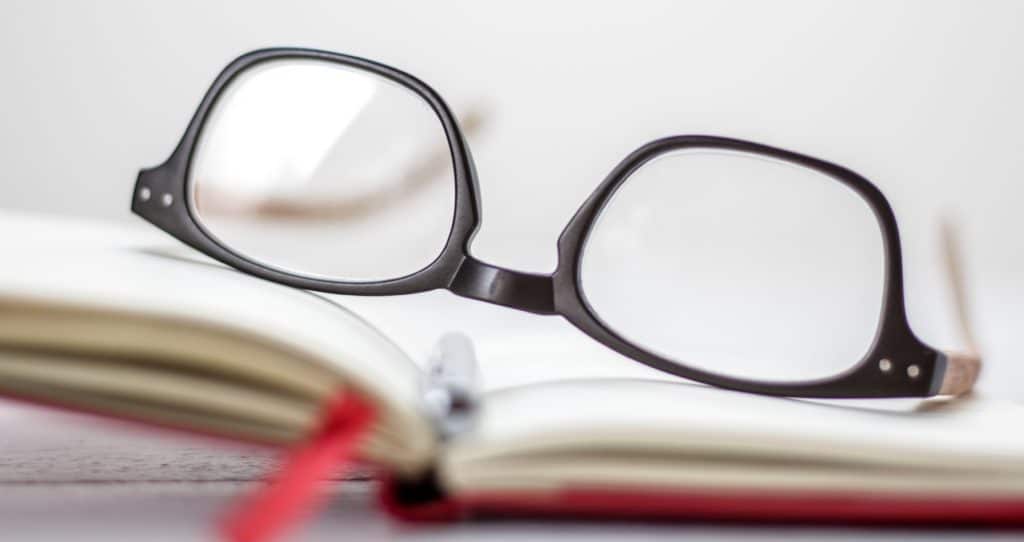[et_pb_section bb_built=”1″ admin_label=”section” _builder_version=”3.0.47″][et_pb_row admin_label=”row” _builder_version=”3.0.47″ background_size=”initial” background_position=”top_left” background_repeat=”repeat”][et_pb_column type=”4_4″][et_pb_text _builder_version=”3.0.106″ background_size=”initial” background_position=”top_left” background_repeat=”repeat” background_layout=”light”]

Whenever I lose my glasses, which, I’m embarrassed to admit, happens increasingly frequently, my world devolves into a glasses-finding operation. Walking through my house, I stop seeing the art, the dog, or the freshly-picked apples on the counter. Instead, I ask, “Where the heck are my glasses?” and view each piece of furniture as a potential hiding ground. My question sets the stage for what I see as I comb through the house.
Once the misplaced item is found (hopefully), I could create a different future (if I were wiser) by asking new questions instead of hopelessly playing and replaying my game of lost and found. By asking, “Why do I keep losing my glasses?” and “What system could I use to keep me from losing them so often?” I could create possibilities for change, rather than staying stuck in reaction.
Questions shape what we see
The slogan Make America Great Again, continues to polarize us in the United States. Framed as a question, it sounds like, “Why isn’t America great?” with the embedded assumption that America is not great. Asking that question (and the phrase itself) invites us to look at America and find ways we are “not great.”
If we were seriously interested in manifesting the greatness inherent in phrases like “liberty and justice for all,” we might begin with a set of questions that offer a different lens through which to view the country:
- In what ways is America great today?
- What values lie underneath our true greatness?
- Where are we living those values?
- What stories do we have that capture the essence of this greatness?
- Why is being great important?
- When we embody our greatness, how do we act?
- What could we do to bring out more of our true greatness–and make sure it benefits all?
When we examine our world for signs of true greatness rather than its lack, we start finding lots of examples.
We also see the gap between our values and our reality. We’re provoked to act out of our desire to do more of what is good, rather than fixing what is broken.
How to change the narrative, one question at a time
Sometimes the cultural narratives we live in, our “big stories,” are outdated.
For example, the narrative that shapes how we look at growing older is usually some version of “aging-as-something-to-be-avoided-as-long-as possible,” “aging-as-a-problem-to-be-fixed,” or simply “gloom, doom, and decline.”
No wonder as a society we’re not turned on about getting old!
If we started asking questions that offered a different frame, we’d kindle a more hopeful perspective.
Next week, after my talk at Sageing International’s Global Conference in Minneapolis, I’m going to invite audience members to try out a few questions. Sageing participants support positive, conscious aging, so imagine the energy if people started asking each other:
- How are you thriving now that you are past midlife?
- What are you exploring or discovering that inspires you??
- How is your life vibrant today?
- What is calling to you now?
The mere act of asking those questions subverts the old narrative!
“Questions are fateful. They determine destinations. They are the chamber through which destiny calls.” – Godwin Hiatshwayo
Let questions shape the world we want
Looking for what we want doesn’t require that we deny the shortcomings or problems in our society. We acknowledge the gap between our aspirations and values and our current reality, and then ask:
“What’s a change we could make today to bring us more in line with our values?”
The world orients to our questions.
Want to give it a go? You’re welcome to try out these:
- What about life has pleased you today?
- Where in your life are you feeling most yourself?
- Where did you catch yourself thriving?
Or, you could always borrow mine:
“Where did I leave my glasses tonight?”

[/et_pb_text][/et_pb_column][/et_pb_row][/et_pb_section]









